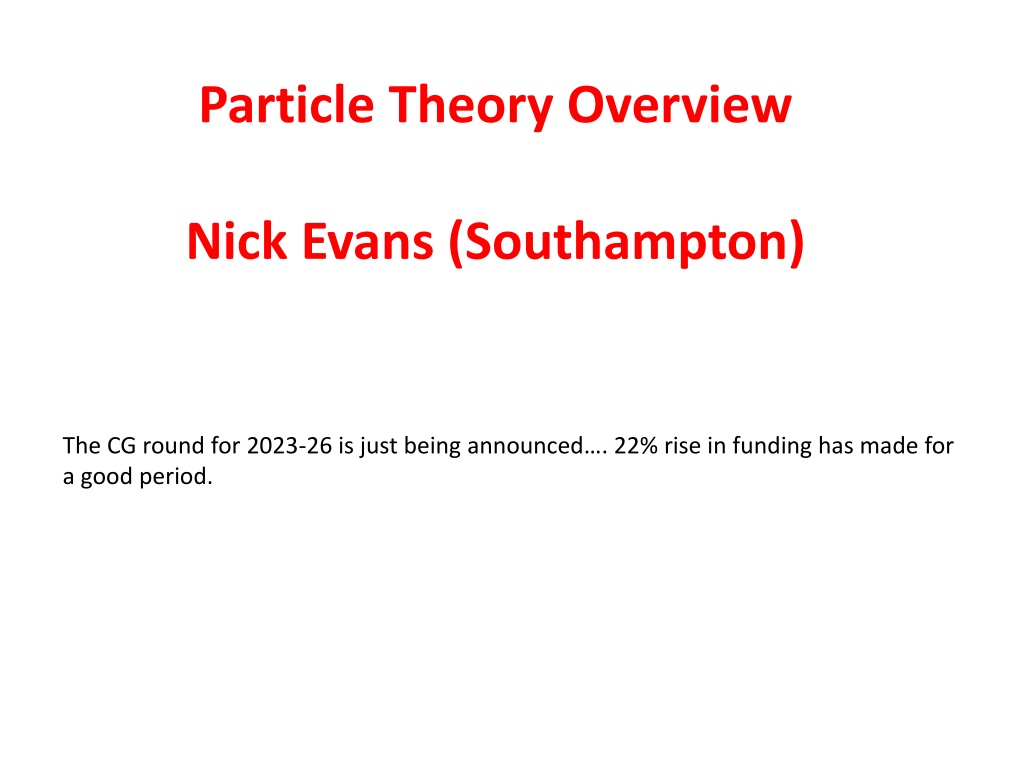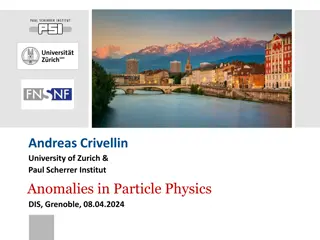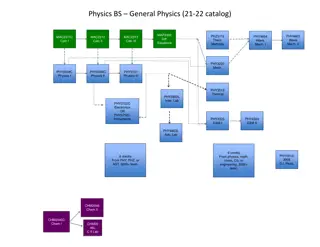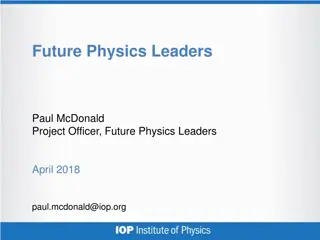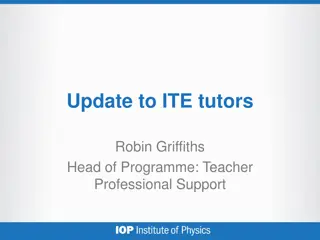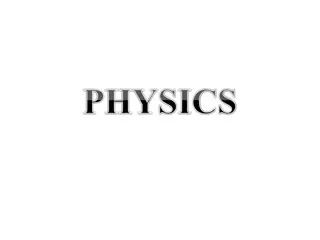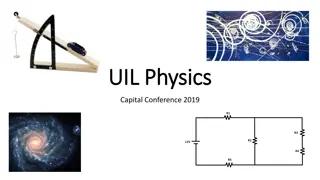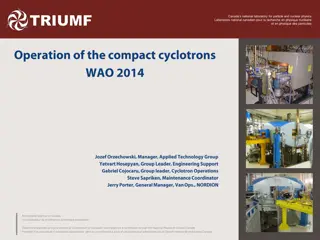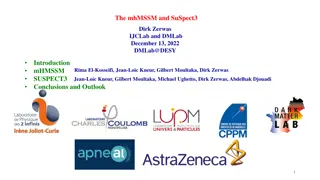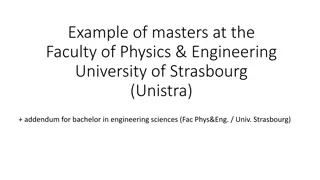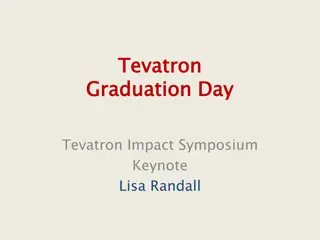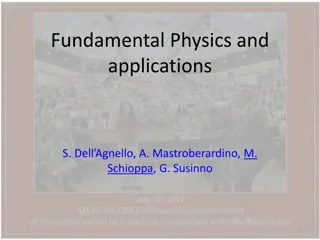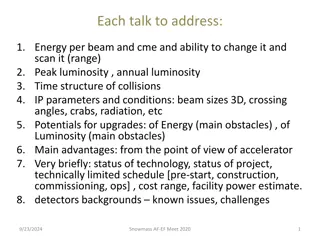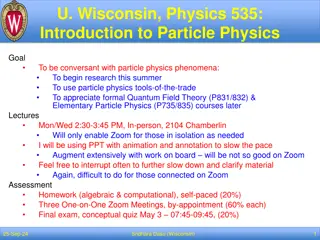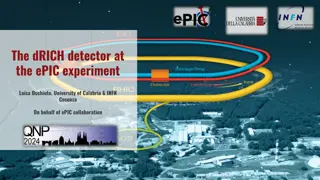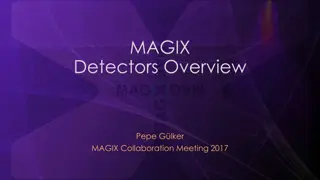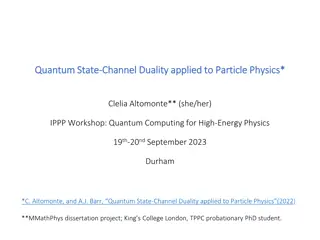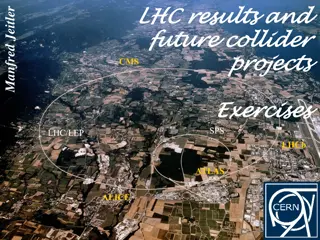Particle Theory Overview: Funding Rise and Academic Quality Boost in UK Theoretical Physics
The recent announcement of a 22% rise in funding for UK theoretical physics marks a positive period for the field. The PPGP(T) Panel chaired by Nick Evans of Southampton has seen a growth in academic numbers, quality, and leadership since 2019. Phenomenology plays a crucial role in guiding search strategies and communicating theory and experimental constraints. IPPP leads developments in parton distribution functions and AI/machine learning for precision theoretical models.
Download Presentation

Please find below an Image/Link to download the presentation.
The content on the website is provided AS IS for your information and personal use only. It may not be sold, licensed, or shared on other websites without obtaining consent from the author. Download presentation by click this link. If you encounter any issues during the download, it is possible that the publisher has removed the file from their server.
E N D
Presentation Transcript
Particle Theory Overview Nick Evans (Southampton) The CG round for 2023-26 is just being announced . 22% rise in funding has made for a good period.
The PPGP(T) Panel Nick Evans, Southampton (Chair) (QFT/strings) Sarah Verth STFC Ass. Director Karen Clifford Head of PP Jane Long STFC Grants Manage Lindsay Clark Prog manager Nicole Ashman Prog manager Richard Ball - Edinburgh (phenomenology) Daniel Maitre Durham IPPP (phenomenology) Christoph Englert Glasgow (phenomenology) Gert Aarts Swansea (lattice) Claudia de Rham Imperial (astroparticle - formal) Malcolm Fairbairn KCL (astroparticle - pheno) Gabriele Travaglini - Queen Mary (QFT) Sakura Schafer-Nameki - Oxford (Strings) Susha Parameswaran Liverpool (Strings) Special thanks to everyone here who have had to do extra work relative to a normal round this year. + 2 from experimental panel Ryan Nichol UCL (experimental) Helen O Keeffe Lancaster (experimental)
24 UK Theory Groups (243 staff) Cambridge phenomenology; strings; QFT; lattice City Durham + Newcastle Maths QFT; strings - IPPP phenomenology; cosmology Edinburgh + HW phenomenology; lattice; QFT; strings; cosmology Glasgow phenomenology; lattice Imperial QFT; strings KCL Maths QFT; strings - Physics cosmology; phenomenology Lancaster & Sheffield cosmology; phenomenology Liverpool phenomenology; QFT; strings; lattice Manchester cosmology; phenomenology Newcastle cosmology Nottingham cosmology; QFT Oxford phenomenology; QFT; strings; cosmology Plymouth lattice QMUL QFT; strings Southampton phenomenology; cosmology; lattice; QFT; strings SEPTA cosmology; phenomenology; QFT (Sussex, UCL; RHUL) Surrey QFT; strings Swansea QFT; strings; lattice ; cosmology UCL phenomenology 50% growth since 2011 QFT; strings 10% growth since 2019 In total 56 science areas requested funding
The panel noticed not just a rise in academic numbers but also a rise in academic quality and leadership since 2019. (The panel directly considered covid impact in its decisions.)
Phenomenology Guides search strategies & communicates theory and experimental constraints IPPP lead for UK. Parton distribution functions Monte Carlo development - HERWIG, SHERPA AI/Machine Learning for data and models Precision SM SMEFT - QCD - N3LO - higgs NLO & N3LO computations - neutrino (with many expts) - flavour (with LHCb and NA62 and g-2) Model building naturalness; discrete flavour symmetries NOTE: no precision experiment can be done without a robust theoretical prediction!
Lattice Including QED and isospin-breaking effects Precision calculations of Standard Model phenomenology, such as: Nucleon structure Kaon/D physics and rare decays b-physics ? g-2 Crucial for precision tests of SM and search for BSM signals Hadron resonances and multihadron scattering BSM studies using non-QCD theories composite higgs, DM, holographic cosmology ML & quantum simulation for lattice field theories
Cosmology/Astro-particle/Dark Theory DM WIMPS, Axions, primordial BHs & their signals Dark energy & fine tuning Cosmological scalars (including higgs), inflation mechanisms and models Gravity wave signals of phase transitions (SM or dark) Modified gravity in the IR eg massive gravity String phenomenology
Quantum Field Theory * Supersymmetric gauge theories * Conformal theories (IR fixed points and UV asymptotic safety) * Integrable models eg N=4 SYM large sectors have been exactly solved even at strong coupling * Bootstrap methods in conformal models * Amplitude methods escaping Feynman Diagrams and efficient computation * Using amplitudes for gravity wave signals double copy method
Gauge/Gravity Duality/Strings * Black Hole information loss progress; holographic interpretations of interior; fuzzball picture * Chaos and scrambling * Holography for boundary CFTs, black holes, neutron star equation of state, (magneto) hydrodynamics * ML in string cosmology * deeper understandings of M-theory/branes * dS space in string theory
Initial Process We originally had to plan around flat (+ inflation) cash We have inherited funding only 2/3rds of academics this is very uncomfortable death of the balanced pathway beware leadership roles beware trying to strike out in a new direction Given increasing academic numbers best we could hope was to preserve this. Increasing academic numbers remains a boon for the community. We expect PIs to use their funding to support full groups not just named academics Overheads (only) up 3% vs 2019. Our strategic guidance from STFC Theory Review is to protect and grow RA numbers - we hoped to protect RA numbers The only way to free money is to continue to pressure academic time we declared this to be a computed variable after the preservation of the programme it came out at 4% (down from 8%) - clearly fEC is dead groups are still growing which suggests there is understanding in Universities . not ideal
Travel + Support + Consumables These have been frozen for over a decade and we again froze them Flat cash Uplift We expect most groups to have underspend on their 2019 CG they can no cost extend . Travel and subsistence Computing / consumables Secretarial support 4500 per FTE 4500 per FTE 1800 per FTE 1800 per FTE 1.25% per FTE to the nearest 10% 1.25% per FTE to the nearest 10% Computing support 1.5% per FTE to the nearest 10% 1.5% per FTE to the nearest 10% Has to be hitting communication of UK results and international impact. Green agenda: leadership vs damage need national guidance PPGP(T) does not fund experiment contributions please compete in PPGP(Ex)!
IPPP & Virtual Centres Science Board moved IPPP core funding to a separate panel and PPGP(T) did not assess the core work. Pre-covid PPGP(T) had encouraged the set up of Lattice Strings Cosmology Virtual Centres To encourage cohesion in the community a la IPPP they valiantly tried online . Considered a positive addition to the community. The panel renewed their funding to allow them a shot in the post covid period!
Outreach STFC has direct grants for outreach on the CG we only fund outreach directly linked to the research agenda in practice this is none. Print: New Scientist Guardian Times Radio: eg In Our Time; Infinite Monkey Cage Dana Centre Caf Scientifque Science Societies Teacher visits to CERN University Open Days Masterclasses Talks to schools British Science Week Science Exhibitions Science at Music Festivals Teacher CPD
Flat cash programme Scientific/Technical Excellence International Competitiveness Strategic Value within STFC Programme Scientific Leadership, planning project management Social and Economic Impact 164 funded academics 124 RA years awarded according to quality; panel scored; panel discussed for 2 days. The panel considered this a meagre programme
+22% to core programme Thanks to STFC & UKRI for making the core case 18M -> 22M
The panel was expecting a rise and had discussed how to use it: raising fEC would give 100% to Universities; yet we couldn t raise it sufficiently to change academics lives. We could fund more academics again essentially gifting the money to Universities nevertheless we did revisit the border line and funded 10 or so more academics including ECRs Funding 55 further RA years would directly increase science output and give Universities additional overheads 1 3 year RA for every 4 acaedmics More travel funds were considered (covid under spend) left as mop up of left over We went to Science Board to approve this decision. Then we rescored and reconvened to assign the additional money.
The proposed RA increase (+45%) did mean some of the largest top scored (well resourced) groups had not put in sufficient RA cases a few have not got 1-2 years of proportionate funding However, the CG allows a balanced distribution of resource. An additional round of funding would have brought delays; overly favoured the top scoring groups; and been an administrative pain all round . The panel believes its proposed assignment makes excellent use of the resource * we raised many 2 year positions to 3 years * larger groups were funded more proportionately * some smaller groups awarded RAs that have potential to hugely increase productivity. We hope overall that the community will be happy with the additional funding available.
OFFICIAL SENSITIVE SB.22.XX.XX 5. Investigators Comparison of the requested and awarded for investigators and responsive posts: Balance of Programme Responsive posts Split of Requests (R) and Awards (A) Across Science Themes 100% 14% 14% 17% 18% 19% 90% 19% 20% 21% 20% 21% 27% 29% 80% 21% 28% 28% 18% 70% 20% 25% 28% 26% 13% 26% 29% 15% 60% 50% 30% 18% 32% 31% 35% 30% 25% 34% 34% 40% 26% 23% 31% 30% 21% 16% 11% 10% 18% 15% 13% 20% 14% 11% 11% 15% 10% 10% 18% 18% 17% 17% 15% 14% 13% 13% 13% 13% 12% 10% 0% 2005 A 2008 A 2011 R 2011 A 2013 R 2013 A 2016 R 2016 A 2019 R 2019 A 2022 R 2022 A Cosmology Lattice Phenomenology QFT Strings 23 OFFICIAL SENSITIVE
Overview & Outlook The panel thinks the uplift has placed STFC support for particle theory at a sensible level for the size of the field. We hope it will raise moral and research output. We think the UK theory community is growing in science leadership and will exploit the funding superbly. Full economic cost is a problem still it s not funded sufficiently. There s only one more bite left in it to protect the programme from inflation (10%+!!) (some panels fund far fewer academics at a higher level but that s the same problem rewritten!) The community is likely to keep growing and further pressure funding decisions.
